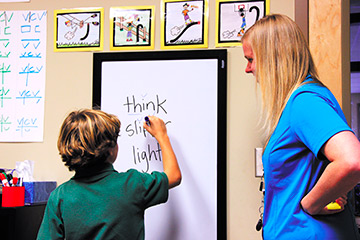By Kacey Matthews
Although strides are being made to educate people about dyslexia, many still misunderstand what dyslexia is. Dyslexia is defined as “a specific learning disability that is neurological in origin. It is characterized by difficulties with accurate and/or fluent word recognition and by poor spelling and decoding abilities. These difficulties typically result from a deficit in the phonological component of language that is often unexpected in relation to other cognitive abilities and the provision of effective classroom instruction.
Secondary consequences may include problems in reading comprehension and reduced reading experience that can impede the growth of vocabulary and background knowledge,” (Lyon, Shaywitz, and Shaywitz, 2003).

Kacey Matthews and a student at St. Anthony School in Madison use ‘coding,’ part of an Orton-Gillingham-based program of dyslexia therapy. Dyslexia affects 80 percent of those identified with learning disabilities, but students can still excel with the right therapy. (Photo by Jennifer Kelemen)
The good news is that with a trained therapist and the correct therapy, such as the Orton-Gillingham based dyslexia therapy, dyslexic children can succeed in school and then in whatever field they choose to pursue.
In 2012, the state of Mississippi passed a law which made kindergarten and first grade dyslexia screenings mandatory for public schools. This is where many of the schools in the Diocese of Jackson are ahead of the curve. Not only are they providing screenings, but some have Mississippi Department of Education certified dyslexia therapists on campus servicing students during school hours.
“Children with dyslexia are highly intelligent, and my son is no exception. But, the right dyslexia therapy and therapist are so important for their success. Having to do therapy after school is extremely hard for the child and the family,” said Krista Andy, a parent of a child with dyslexia. “The progress our son has made by seeing a dyslexia therapist four days a week during school is invaluable to our family. Every dyslexic child should be able to experience what St Anthony provides,” she added.
At St. Anthony School, students are seen individually or in groups three to five times a week which is recommended by the latest research. The students receive intensive intervention using an Orton-Gillingham-based program. The program is open to students from kindergarten through sixth grade, and is year-round. The students continue their therapy at the school four times a week for six weeks in the summer.
“Year-round intervention helps to limit summer regression,” said Joanna Johnson, the speech language pathologist at St. Anthony, as well as the parent of a dyslexic child enrolled in the program. “When struggling students finally experience success, the therapy becomes personally motivating, and many even decide they like to read. Consistency and frequency of the correct interventions are the keys to unlock any students’, like my child’s, full potential,” she said.
Having a full-time therapist on staff creates a cohesive learning environment allowing for transfer of skills from dyslexia therapy to the classroom. “In this way the therapist and the classroom teacher have daily opportunities for communication about the student. Younger students, especially dyslexic students, who have worked hard all day are very tired after school hours. They retain much more information when therapy is offered during (class time),” said Cathy Lutz, a first grade teacher at St. Anthony.
Jackson St. Richard and Madison St. Joseph schools also have dyslexia therapy programs. Administrators believe including them helps ensure each child finds success no matter their difference.
(Kacey Matthews is the resident dyslexia therapist at St. Anthony School. She will be presenting on K-5 Literacy Strategies for the Dyslexic Learner at the upcoming October Dyslexia Seminar at Mississippi College.)
